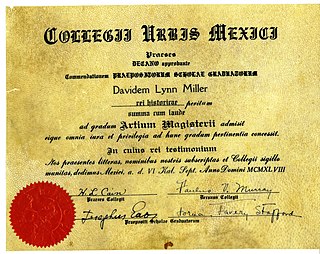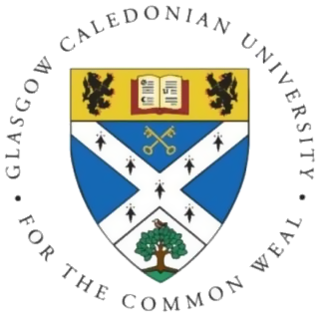Education in England is overseen by the United Kingdom's Department for Education. Local government authorities are responsible for implementing policy for public education and state-funded schools at a local level.

A diploma is a document awarded by an educational institution testifying the recipient has graduated by successfully completing their courses of studies. Historically, it has also referred to a charter or official document of diplomacy.
Education in Scotland is overseen by the Scottish Government and its executive agency Education Scotland. Education in Scotland has a history of universal provision of public education, and the Scottish education system is distinctly different from those in the other countries of the United Kingdom. The Scotland Act 1998 gives the Scottish Parliament legislative control over all education matters, and the Education (Scotland) Act 1980 is the principal legislation governing education in Scotland. Traditionally, the Scottish system at secondary school level has emphasised breadth across a range of subjects, while the English, Welsh and Northern Irish systems have emphasised greater depth of education over a smaller range of subjects.

The British undergraduate degree classification system is a grading structure for undergraduate degrees or bachelor's degrees and integrated master's degrees in the United Kingdom. The system has been applied in other countries and regions.

The Russell Group is a self-selected association of twenty-four public research universities in the United Kingdom. The group is headquartered in Cambridge and was established in 1994 to represent its members' interests, principally to government and Parliament. It was incorporated in 2007. Its members are often perceived as the UK's most prestigious universities, but this has been disputed.
A graduate diploma is generally a qualification taken after completion of a first degree, although the level of study varies in different countries from being at the same level as the final year of a bachelor's degree to being at a level between a master's degree and a doctorate. In some countries the graduate diploma and postgraduate diploma are synonymous, while in others the postgraduate diploma is a higher qualification.
Three national rankings of universities in the United Kingdom are published annually – by The Complete University Guide, The Guardian and jointly by The Times and The Sunday Times. Rankings have also been produced in the past by The Daily Telegraph andFinancial Times. UK Universities also rank highly in global university rankings with 8 UK Universities ranking in the top 100 of the three major global rankings - QS World University Rankings, Times Higher Education World University Rankings and Academic Ranking of World Universities.
The Higher Education Funding Council for England (HEFCE) was a non-departmental public body in the United Kingdom, which was responsible for the distribution of funding for higher education to universities and further education colleges in England since 1992. It ceased to exist as of 1 April 2018, when its duties were divided between the newly created Office for Students and Research England.

Glasgow Caledonian University, informally GCU, Caledonian or Caley, is a public university in Glasgow, Scotland. It was formed in 1993 by the merger of The Queen's College, Glasgow and Glasgow Polytechnic.
Education in Vietnam is a state-run system of public and private education run by the Ministry of Education and Training. It is divided into five levels: preschool, primary school, secondary school, high school, and higher education. Formal education consists of twelve years of basic education. Basic education consists of five years of primary education, four years of secondary education, and three years of high school education. The majority of basic education students are enrolled on a daily basis. The main education goal in Vietnam is "improving people's general knowledge, training quality human resources, and nurturing and fostering talent."

The Higher Education Statistics Agency (HESA) was the official agency for the collection, analysis and dissemination of quantitative information about higher education in the United Kingdom. HESA became a directorate of Jisc after a merger in 2022.
Graduate unemployment, or educated unemployment, is unemployment among people with an academic degree.
The National Student Survey is an annual survey, launched in 2005, of all final year undergraduate degree students at institutions in England, Scotland, Wales and Northern Ireland within the United Kingdom. The survey is designed to assess undergraduate students' opinions of the quality of their degree programmes, with seven different scores published including an "overall satisfaction" mark.

The Drexel University Thomas R. Kline School of Law is the law school of Drexel University located in Philadelphia, Pennsylvania, USA. The School of Law opened in the fall of 2006 and was the first new law school in Philadelphia in over thirty years, and is the newest school within Drexel University. It offers Juris Doctor, LLM and Master of Legal Studies degrees and provides the opportunity for all students to take part in a cooperative education program.
Chiropractic education trains students in chiropractic. The entry criteria, structure, teaching methodology and nature of chiropractic programs offered at chiropractic schools vary considerably around the world. Students are trained in academic areas including scopes of practice, neurology, radiology, microbiology, psychology, ethics, biology, gross anatomy, biochemistry, spinal anatomy and more. Prospective students are also usually trained in clinical nutrition, public health, pediatrics and other health or wellness related areas.
The Destinations of Leavers from Higher Education survey or DLHE was a statistical survey which aimed to contact UK and EU domiciled graduates from higher education (HE) programmes six months after qualifying from their HE course. Its aim was to establish what type of employment or further study they were engaged in, and their income, on one specific day in the survey period.

Education in Jersey is overseen by the Department for Children, Young People, Education and Skills. The Government is responsible for all Government-maintained schools on the island, including the Further Education College, Highlands College, as well as the fee-paying schools of Victoria College and Jersey College for Girls. There are also independent schools and religious schools, including De La Salle College, Beaulieu Convent School and St Michael's School.
Higher education in the United States is an optional stage of formal learning following secondary education. Higher education, also referred to as post-secondary education, third-stage, third-level, or tertiary education occurs most commonly at one of the 4,360 Title IV degree-granting institutions, either colleges or universities in the country. These may be public universities, private universities, liberal arts colleges, community colleges, or for-profit colleges. US higher education is loosely regulated by several third-party organizations.






